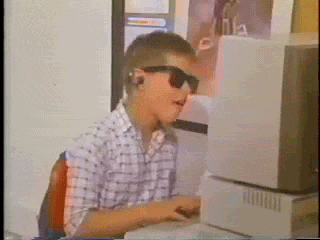Name: brandan
Location: Van Buren, AR
Posts: 13061
Location: Van Buren, AR
Posts: 13061
Watching a ball comes naturally to those of us who aren't blind and can exercise at least a modicum of self-control and focus, but what does it mean to relax? For a five year old holding up a red plastic baseball bat and anticipating the next underhanded pitch of an over-sized plastic baseball with faux stitching, it means to loosen your back, arm, hand, neck, and jaw muscles. To relax is to allow your body the freedom to execute a pattern of movements smoothly and with as little expenditure of energy as necessary. The baseball swing is a chain reaction, a process of bodily preparation ideally resulting in the concentration of a great amount of energy into a point of contact between bat and ball. Excess energy focused in the backswing requires greater energy to initiate the forward swing, which impacts timing, balance, and orientation. If the muscle groups active in the backswing are engaged too fully, unnecessary energy is spent to transfer that energy forward to make contact with the ball. The baseball swing requires a solid base to be provided by the lower body. If the base isn't firmly established, torque from the upper body will result in significantly inconsistent swing paths. The baseball swing, like other mechanics of athletic locomotion, is a product of rehearsal. To be successfully executed, the body and mind must be free of conflict, such as that resulting from a subtly inefficient torque plane and excessive tension in transferring energy from backward to forward momentum.
Like soccer, which is not baseball, Quake requires constant movement. There is no sitting in the dugout while waiting for a turn at bat, nor resetting at a scrimmage line after the handegg has been downed. Improperly dedicating energy to superfluous movement promotes fatigue. For a game such as Quake, which requires at least ten minutes of constant movement and concentration, such fatigue has profound consequences on performance. Successful athletes, whether casual, amateur, or professional, will all benefit from developing tendencies that focus on efficiently managing locomotive economy.
"Remember to breaaaaaaaaaaaaaaaaaaaaaaaaaaaaaathe" - Dashboard Confessional (http://www.youtube.com/watch?v=I9R9Bmn2gt8)
I regularly catch myself forgetting to breathe while dueling. The ramifications of oxygen deprivation are numerous. Lowered blood oxygen levels (http://en.wikipedia.org/wiki/Blood_oxygen_level) limit mental faculties, stunting the capacity for concentration and memory. Muscle responsiveness is reduced, requiring greater effort to execute controlled, precise movements. If breathing is not corrected, fatigue increases, efficiency decreases, oxygen levels decrease further, and these effects cascade, leading to ever-degraded performance consisting of a confused state of jerky, reactionary behavior. Will is lost and impulse takes control. Without a good foundation of skills, such impulsive play results in repetitive and predictable behavior.
Knowing these detriments, however, does nothing for preventing them. It only highlights the importance of developing adequate breathing tendencies. As of writing this column, my best solution is to create a say_team bind reminding me to relax and breathe. The hope is that such a bind leads to a Pavlovian response to the chat beep, wherein my diaphragm is reminded to do its job, ultimately resulting in training my body to behave more efficiently without prompt.
"Stretching improves balance, physical performance, and blood circulation." - Wikipedia (http://en.wikipedia.org/wiki/Stretching)
According to my personal experience, stretching inhibits stress and helps to clear my mind and reset my focus. Any form of physical effort positively alters my mood and inflates my desire to do well. According to Wikipedia (http://en.wikipedia.org/wiki/Physical_exercise), regular exercise:
increases the blood and oxygen flow to the brain
increases growth factors that help create new nerve cells and promote synaptic plasticity
increases chemicals in the brain that help cognition, such as dopamine, glutamate, norepinephrine, and serotonin
Simplified: regular exercise promotes learning and thinking. Applied to skill development, exercise promotes general well-being, creating an environment within the body in which learning and growth are nurtured rather than negated. My personal experience has been that, when sedentary, my will to skill has also been sedentary. Desire and ambition must be sought, and the pursuit becomes a trudge through the mires of pointlessness and apathy. After a simple mile hike I am breathing more fully and have somehow discovered ambition without having looked, my arms swing loosely at my sides, balancing my movements through unforced pendular action. There is a feeling underneath the skin after having been depressed and then exercising, as though there's a subtle itch scratching itself, the friction of that scratching generating warmth; it's something like the inflation of a hot air balloon, the fabric billowing against itself until filled.
Healthy exercise is not far detached from healthy diet. Articles abound supporting the claim that diet and exercise play overwhelmingly large roles in quality of life, helping to determine general feelings, energy levels, thinking patterns, awareness, will power, and so on. To once again cite my personal experience, the difference between a diet of nutritious food versus food devoid of nutrition (or even negatively nutritious) is like the difference between walking across a bed of hot coals wearing insulated fireproof boots and stripping off your clothes, scouring your entire body with a wire brush, dousing yourself with kerosene, then flopping down to make furious love with one particular hot coal that seems to be a little less self-absorbed than the rest.
For much of my life I would laugh at athletes interviewed after games. The typical basketball interview:
Commentator: Dante, you were down 6 four minutes into the fourth quarter, but you scrambled to get back into the game. Can you tell me how you did it?
Dante: Well, basically (sweat bursts from Dante's moustache with each word uttered upon his labored breath) we just executed. Before the fourth quarter, we weren't really executing, but in the fourth quarter we pulled everything together and were able to execute.
Commentator: Can you tell me a little bit about what when wrong for Opposing Team(tm)?
Dante: Well, basically, Opposing Team(tm) started the game with really good execution, but around the fourth quarter their execution was slipping.
Commentator: Any words for your fans?
Dante: I couldn't have done it without our lord and savior, Jesus Christ.
But at some point my thinking changed. This is all that a professional athlete has to worry about: execution. The plays and movements and rules and such are so well drilled into their minds and bodies that their only concern once in game is to execute what they know to do. They're not idiots incapable of elegantly expressing elaborately plotted strategic maneuvering, but rather brilliant athletes demonstrating the brevity of thought necessary to be successful in a competitive sport.
"Perfect practice makes perfect" - Random Reddit User
Relaxation requires a clear mind, a capacity to focus on the key elements of a game that matter, rather than allowing the mind to be overwhelmed with noisy information that is not relevant to a given situation. That capacity for focus requires thoughtful preparation and practice. Being able to focus on what to do, rather than what not to do, eliminates conflictory thought in game. Spending some time rehearsing possible responses to difficult in-game situations, just as basketball players drill plays religiously, gives players tools to commit to courses of action without the wasteful effort of doubt and confusion. The course of action may or may not be appropriate, but it will be the result of a greater amount of thought and effort than the time spent in-game confusedly wondering which path to take to where.
There are a few elements of my approach to duel that I am currently focusing on improving, but relaxation has become the main. Tense muscles grinding the mouse into the desk and a rigid claw scraping the letters off the keyboard means LG battles thrown away and pixel rails missed. It means forgetting item times and enemy locations. It means running around the map like a harmless blue ghost, giving Pac-Man uncontested access to every big white ball he wants. It means rushing into the street like a starving dog to grab a half-decayed bird wing, looking up to see the fully loaded semi screaming forward to deliver you into oblivion.
Edited by Herr at 06:27 BST, 23 June 2013 - 78571 Hits



